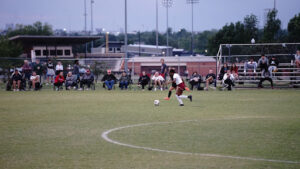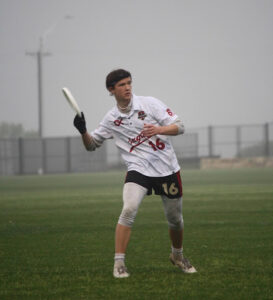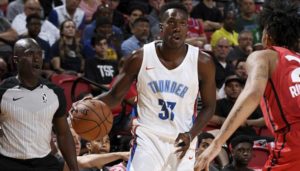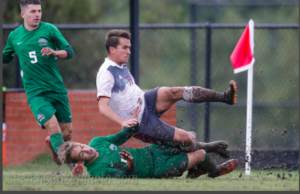The NCAA sets limitations on the amount of hours student-athletes are allowed to participate in sports-related activities. At 20 hours per week during season for practice and academics, “you really don’t have much of a social life.”
Sophomore Grace Simpson, a member of the women’s soccer team, said the time spent only doing soccer and school took a toll on her mental health.
“I didn’t have a whole lot of friends besides my team, so when I saw them at practice, that was my social time,” Simpson said. “I just stayed in my room most of the time, which was not good for me mentally.”
Junior Stephen Tower said being a member of the men’s soccer team consumed his day and left little time for socialization outside of his teammates.
“The week involved morning workouts, class, practice and, on away trips, having to miss a fair bit of school,” Tower said. “You really don’t have much of a social life during that time outside of your teammates, roommates and people you run into during your daily routine.”
Despite having a limited amount of time, both Simpson and Tower said they decided to rush a social service club on campus to increase their community connection.
According to the Oklahoma Christian website, “social service clubs provide a great way to form close relationships and grow spiritually. Thirty-nine percent of Oklahoma Christian students are club members.”
Simpson rushed Iota Kappa Phi in the spring of 2018 and said the benefits of being in club far outweigh the time management difficulties.
“I feel a lot happier and just better mentally,” Simpson said. “I could not imagine not joining. If I hadn’t joined, I probably wouldn’t come back next year. It has changed everything about me. I wouldn’t have these friendships. I can see myself hanging out with these people outside of school and graduating and still having these friendships where after graduation if I hadn’t joined I would just be kind of be stuck with my family and maybe my boyfriend, so it’s definitely made the future a little better.”
Tower made the decision to rush Delta Gamma Sigma during the fall of his sophomore year. Tower said he was drawn toward Delta because of the involvement of fellow soccer teammates who were already members and the traditions the club upheld.
“The guys on the soccer team that were in Delta became good friends of mine over my freshman gyear, and due to knowing them well, to the amount of history and tradition Delta has at Oklahoma Christian and all the success they have post-graduation and professionally, it was the only club I ever considered,” Tower said.
Tower has been in club for two years and served as a coordinator for Delta. He said the balance between sports, academics and club has not been too difficult to manage.
“Sometimes it’s difficult, but I just put an emphasis on prioritizing, which makes everything a whole lot easier,” Tower said. “Being in Delta didn’t really add to my schedule, which also helped a lot.”
For Simpson, Iota provided the best option to fit her personality and her schedule because of its no-requirement policy. The constitution of Iota does not require its members to earn any points for service, sports or meetings.
Because of the professional connections and friends gained, Tower said he recommends experiencing club life to every athlete.
“It’s just adding some of your best friends and eventual professional connections to your life,” Tower said. “A ton of my favorite memories in college have come from my decision to rush Delta, and I would recommend that to any athlete.”
Similar to Tower, Simpson said she would encourage every athlete to try club even if it just involves part-time participation.
“If you don’t want to do Iota, do part time for somebody else,” Simpson said. “Just try it. If you don’t like it, you don’t like it, but I would encourage everybody and anybody to rush, because it’s just a great group of girls and you’ll always have those friendships. You’ll always have somebody to turn to it’s never like, ‘Aw, I don’t have anybody.’ There will always be somebody there for you.”
















Be First to Comment